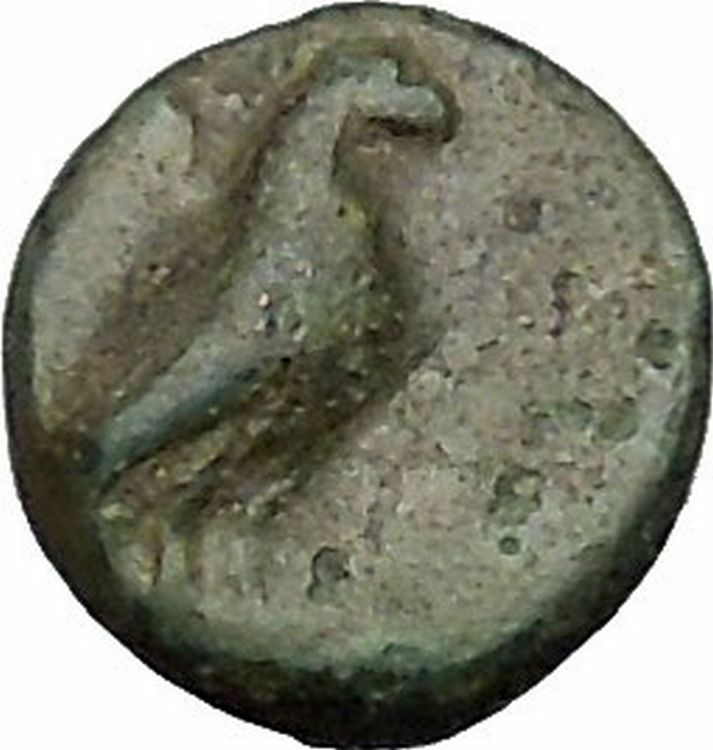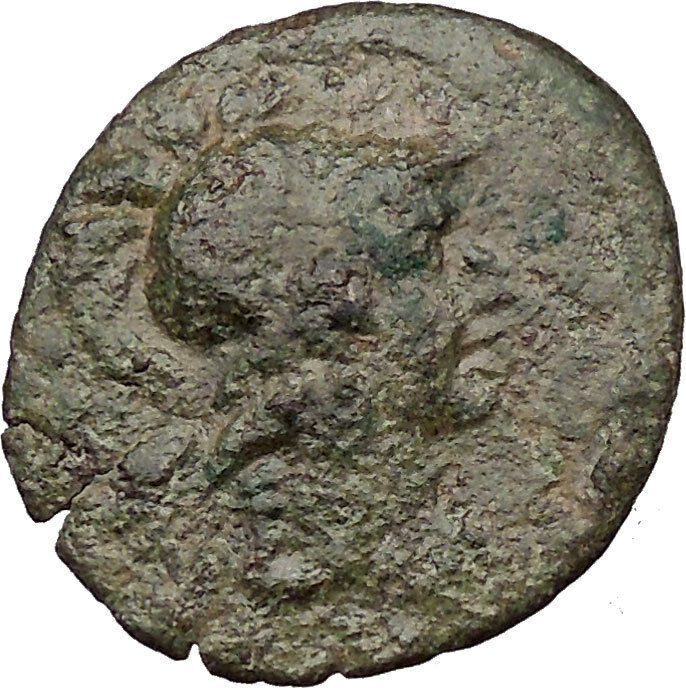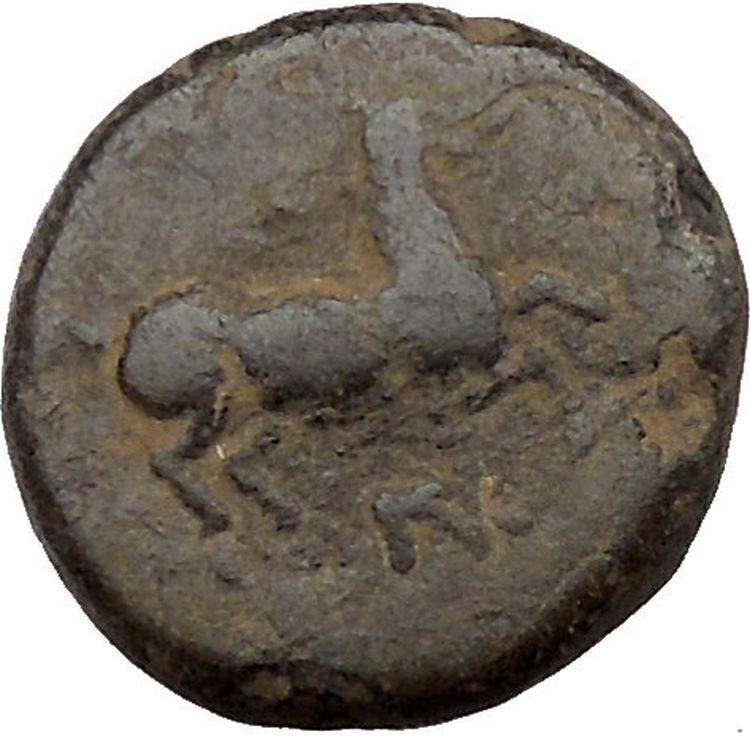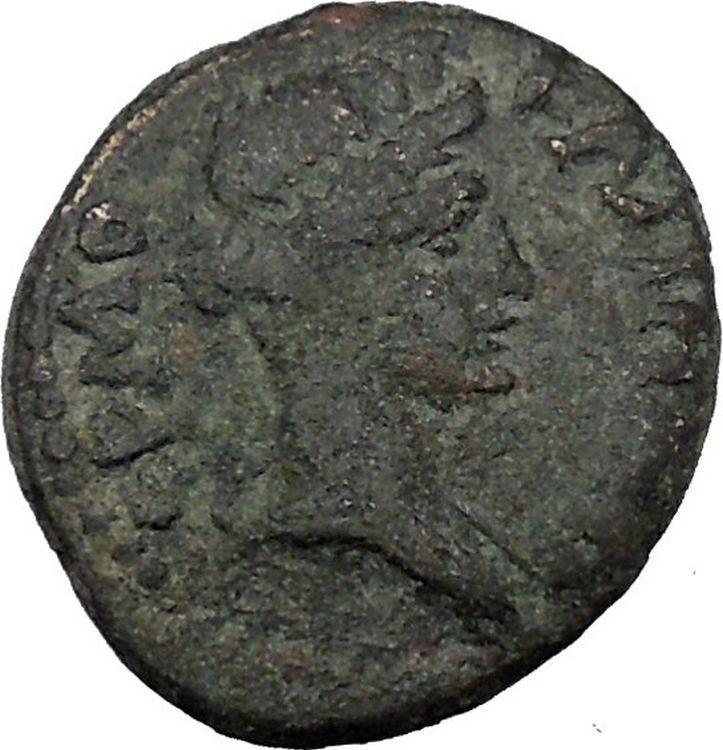|
Ancient
Greek City
Bronze 10mm (0.99 grams) circa 300-100 B.C.
Head of Apollo left.
Lyre.
You are bidding on the exact item pictured,
provided with a Certificate of Authenticity and Lifetime Guarantee of
Authenticity.
The lyre (Greek:
λύρα) is a
stringed musical instrument
known for its use
in Greek
classical antiquity
and later. The word comes
from the
Greek
“λύρα” (lyra) and the earliest
reference to the word is the
Mycenaean Greek
ru-ra-ta-e, meaning
“lyrists”, written in
Linear B
syllabic script. The earliest picture
of a lyre with seven strings appears in the famous
sarcophagus
of
Hagia Triada
(a
Minoan
settlement in
Crete
). The sarcophagus was used during the
Mycenaean
occupation of Crete (1400 BC). The
recitations of the
Ancient Greeks
were acco mpanied mpanied
by lyre playing. The lyre of classical antiquity was ordinarily played by being
strummed with a plectrum
, like a
guitar
or a
zither
, rather than being plucked, like a
harp. The fingers of the free hand silenced the unwanted strings in
the chord. The lyre is similar in appearance to a small harp but with distinct
differences.
The word lyre can either refer specifically to a common
folk-instrument, which is a smaller version of the professional
kithara
and eastern-Aegean
barbiton
, or lyre can refer generally to
all three instruments as a family.
The term is also used
metaphorically
to refer to the work or skill of
a poet
, as in
Shelley’s
“Make me thy lyre, even as the forest
is” or Byron’s
“I wish to tune my quivering lyre,/To
deeds of fame, and notes of fire”
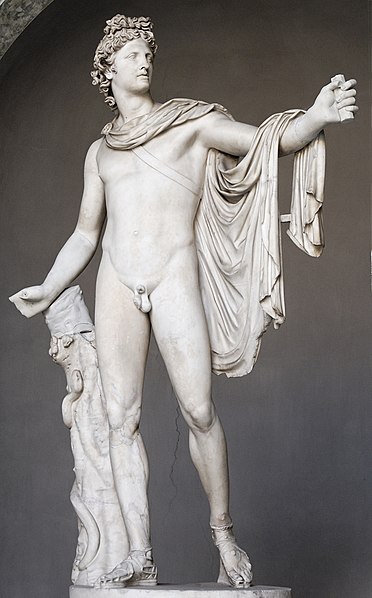
Apollo Belvedere
,
ca. 120–140 CE
Apollo is one of the most important and complex of the
Olympian deities
in
ancient Greek
and
Roman religion
,
Greek
and
Roman mythology
, and
Greco
–Roman
Neopaganism
. The ideal of the
kouros
(a beardless, athletic youth),
Apollo has been variously recognized as a god of light and the sun, truth and
prophecy, healing, plague, music, poetry, and more. Apollo is the son of
Zeus and Leto
, and has a twin sister, the chaste
huntress Artemis
. Apollo is known in Greek-influenced
Etruscan mythology
as Apulu.
As the patron of Delphi
(Pythian Apollo), Apollo was an
oracular
god—the prophetic deity of the
Delphic Oracle
. Medicine and healing are
associated with Apollo, whether through the god himself or mediated through his
son Asclepius
, yet Apollo was also seen as a god
who could bring ill-health and deadly
plague
. Amongst the god’s custodial charges,
Apollo became associated with dominion over
colonists
, and as the patron defender of herds
and flocks. As the leader of the
Muses (Apollon Musegetes) and director of their choir, Apollo
functioned as the patron god of music and poetry.
Hermes
created the
lyre for him, and the instrument became a common
attribute of Apollo
. Hymns sung to Apollo were
called paeans
.
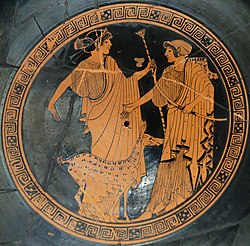
Apollo (left) and
Artemis
.
Brygos
(potter signed), Tondo of an
Attic red-figure cup c. 470 BC,
Musée du Louvre
.
In Hellenistic times, especially during the 3rd century BCE, as Apollo
Helios he became identified among Greeks with
Helios
,
Titan
god of the sun
, and his sister Artemis
similarly equated with
Selene
, Titan
goddess of the moon
In Latin texts, on the
other hand,
Joseph Fontenrose
declared himself unable to
find any conflation of Apollo with
Sol
among the
Augustan poets
of the 1st century, not even in
the conjurations of Aeneas
and
Latinus
in
Aeneid
XII (161–215). Apollo and Helios/Sol
remained separate beings in literary and mythological texts until the 3rd
century CE.
Origins

The Omphalos
in the Museum of
Delphi
.
The cult centers of Apollo in Greece,
Delphi
and
Delos
, date from the 8th century BCE. The Delos
sanctuary was primarily dedicated to
Artemis
, Apollo’s twin sister. At Delphi,
Apollo was venerated as the slayer of
Pytho
. For the Greeks, Apollo was all the Gods
in one and through the centuries he acquired different functions which could
originate from different gods. In
archaic Greece
he was the
prophet
, the oracular god who in older times
was connected with “healing”. In
classical Greece
he was the god of light and of
music, but in popular religion he had a strong function to keep away evil.
From his eastern-origin Apollo brought the art of inspection from “symbols
and omina
” (σημεία και τέρατα : semeia kai
terata), and of the observation of the
omens of the days. The inspiration oracular-cult was probably
introduced from Anatolia
. The
ritualism
belonged to Apollo from the
beginning. The Greeks created the
legalism
, the supervision of the orders of the
gods, and the demand for moderation and harmony. Apollo became the god of
shining youth, the protector of music, spiritual-life, moderation and
perceptible order. The improvement of the old
Anatolian
god, and his elevation to an
intellectual sphere, may be considered an achievement of the
Greek
people.
Healer and
god-protector from evil
The function of Apollo as a “healer” is connected with
Paean
, the physician of the Gods in the
Iliad
, who seems to come from a more
primitive religion. Paeοn is probably connected with the
Mycenean
Pa-ja-wo, but the etymology is the
only evidence. He did not have a separate cult, but he was the personification
of the holy magic-song sung by the magicians that was supposed to cure disease.
Later the Greeks knew the original meaning of the relevant song “paean”. The
magicians were also called “seer-doctors”, and they used an ecstatic prophetic
art which was used exactly by the god Apollo at the oracles.
In the Iliad, Apollo is the healer under the gods, but he is also the
bringer of disease and death with his arrows, similar to the function of the
terrible
Vedic
god of disease
Rudra
.He sends a terrible plague to the
Achaeans
. The god who sends a disease can also
prevent from it, therefore when it stops they make a purifying ceremony and
offer him an “hecatomb” to ward off evil. When the oath of his priest appeases,
they pray and with a song they call their own god, the beautiful Paean.
Some common epithets of Apollo as a healer are “paion” , “epikourios”, “oulios”,
and “loimios” . In classical times, his strong function in popular religion was
to keep away evil, and was therefore called “apotropaios” and “alexikakos” ,
throw away the evil).
In later writers, the word, usually spelled “Paean”, becomes a
mere epithet of Apollo in his capacity as a god of
healing
.
Homer illustrated Paeon the god, and the song both of
apotropaic
thanksgiving or triumph. Such songs
were originally addressed to Apollo, and afterwards to other gods: to
Dionysus
, to Apollo
Helios
, to Apollo’s son
Asclepius
the healer. About the 4th century
BCE, the paean became merely a formula of adulation; its object was either to
implore protection against disease and misfortune, or to offer thanks after such
protection had been rendered. It was in this way that Apollo had become
recognised as the god of music. Apollo’s role as the slayer of the
Python
led to his association with battle and
victory; hence it became the
Roman
custom for a paean to be sung by an army
on the march and before entering into battle, when a fleet left the harbour, and
also after a victory had been won.
Oracular cult

Columns of the
Temple of Apollo
at Delphi, Greece.
Unusually among the Olympic deities, Apollo had two cult sites that had
widespread influence: Delos
and
Delphi
. In cult practice,
Delian Apollo
and
Pythian Apollo
(the Apollo of Delphi) were so
distinct that they might both have shrines in the same locality.Apollo’s
cult
was already fully established when written
sources commenced, about 650 BCE. Apollo became extremely important to the Greek
world as an oracular deity in the
archaic period
, and the frequency of
theophoric names
such as Apollodorus or
Apollonios and cities named Apollonia testify to his popularity.
Oracular sanctuaries to Apollo were established in other sites. In the 2nd and
3rd century CE, those at
Didyma
and
Clarus
pronounced the so-called “theological
oracles”, in which Apollo confirms that all deities are aspects or servants of
an
all-encompassing, highest deity
. “In the 3rd
century, Apollo fell silent.
Julian the Apostate
(359 – 61) tried to revive
the Delphic oracle, but failed
Ancient Greece is the civilization belonging to the period of
Greek history lasting from the
Archaic period
of the 8th to 6th centuries BC
to 146 BC and the
Roman
conquest of
Greece
after the
Battle of Corinth
. At the center of this time
period is Classical Greece
, which flourished during the
5th to 4th centuries BC, at first under
Athenian
leadership successfully repelling the
military threat of
Persian invasion
. The
Athenian Golden Age
ends with the defeat of
Athens at the hands of Sparta
in the
Peloponnesian War in 404 BC. Following the conquests of
Alexander the Great
,
Hellenistic civilization
flourished from
Central Asia to the western end of the
Mediterranean Sea.
Classical
Greek culture
had a powerful influence on the
Roman
Empire, which carried a version of it to many parts of the
Mediterranean region
and
Europe,
for which reason Classical Greece is generally considered to be the seminal
culture which provided the foundation of
Western civilization
.
Chronology
There are no fixed or universally agreed upon dates for the beginning or the
end of
Classical Antiquity
. It is typically taken to
last from the 8th century BC until the 6th century AD, or for about 1,300 years.
Classical Antiquity in Greece is preceded by the
Greek Dark Ages (c.1100-c.750 BC), archaeologically characterised by
the
protogeometric
and
geometric style
of designs on pottery,
succeeded by the
Orientalizing Period
, a strong influence of
Syro-Hittite
,
Assyrian
,
Phoenician
and
Egyptian
cultures.
Traditionally, the
Archaic period
of ancient Greece is taken in
the wake of this strong Orientalizing influence during the 8th century BC, which
among other things brought the
alphabetic script
to Greece, marking the
beginning of Greek literature (Homer,
Hesiod).
The Archaic period gives way to the
Classical period
around 500 BC, in turn
succeeded by the Hellenistic period
at the death of
Alexander the Great
in 323 BC.
The history of Greece
during Classical Antiquity
may thus be subdivided into the following periods:[4]
- The
Archaic period
(c.750-c.500 BC) follows, in
which artists made larger free-standing
sculptures
in stiff, hieratic poses with
the dreamlike ‘archaic
smile‘. The Archaic period is often taken to end with the
overthrow of the last tyrant of
Athens
in 510 BC.
- The Classical period (c.500-323 BC) is characterised by a style which
was considered by later observers to be exemplary (i.e. ‘classical’)—for
instance the Parthenon
. Politically, the Classical
Period was dominated by
Athens
and the
Delian League during the 5th century, displaced by
Spartan hegemony
during the early 4th
century BC, before power shifted to
Thebes
and the
Boeotian League
and finally to the
League of Corinth
led by
Macedon
.
- The Hellenistic period (323-146 BC) is when Greek culture and power
expanded into the near and
middle east
. This period begins with the
death of Alexander and ends with the Roman conquest.
- Roman Greece
, the period between Roman
victory over the
Corinthians
at the
Battle of Corinth in
146 BC and the
establishment of Byzantium
by
Constantine
as the capital of the
Roman Empire in 330 AD.
- the
final phase of Antiquity
is the period of
Christianization
during the later 4th to
early 6th centuries, taken to be complete with the closure of the
Neoplatonic
Academy
by
Justinian I in 529 AD.
Historiography
The historical period of ancient Greece is unique in world history as the
first period attested directly in proper
historiography, while earlier ancient history or
proto-history
is known by much more
circumstantial evidence, such as annals or king lists, and pragmatic epigraphy.
Herodotus is widely known as the “father of history”, his
Histories
being eponymous of the entire
field
. Written between the 450s and 420s BC,
the scope of Herodotus’ work reaches about a century into the past, discussing
6th-century historical figures such as
Darius I of Persia,
Cambyses II and Psamtik III
, and alludes to some 8th-century
ones such as Candaules
.
Herodotus was succeeded by authors such as
Thucydides, Xenophon
,
Demosthenes, Plato
and
Aristotle.
Most of these authors were either
Athenians
or pro-Athenians, which is why far
more is known about the history and politics of Athens than of many other
cities. Their scope is further limited by a focus on political, military and
diplomatic history, ignoring economic and social history.[5]
History
In the 8th century BC, Greece began to emerge from the Dark Ages which
followed the fall of the Mycenaean civilization. Literacy had been lost and
Mycenaean script
forgotten, but the Greeks
adopted the Phoenician alphabet
, modifying it to create the
Greek alphabet. From about the 9th century BC written records begin
to appear.[6]
Greece was divided into many small self-governing communities, a pattern largely
dictated by Greek geography, where every island, valley and plain is cut off
from its neighbours by the sea or mountain ranges.[7]
The Lelantine War
(c.710-c.650 BC) was an ongoing
conflict with the distinction of being the earliest documented war of the
ancient Greek period. It was fought between the important
poleis
(city-states)
of Chalcis
and Eretria
over the fertile Lelantine plain of
Euboea.
Both cities seem to have suffered a decline as result of the long war, though
Chalcis was the nominal victor.
A mercantile class
rose in the first half of the
7th century, shown by the introduction of
coinage
in about 680 BC.[citation
needed] This seems to have introduced tension to many
city-states. The
aristocratic
regimes which generally governed
the poleis were threatened by the new-found wealth of merchants, who in turn
desired political power. From 650 BC onwards, the aristocracies had to fight not
to be overthrown and replaced by
populist
tyrants
. The word derives from the
non-pejorative
Greek τύραννος tyrannos,
meaning ‘illegitimate ruler’, although this was applicable to both good and bad
leaders alike.[8][9]
A growing population and shortage of land also seems to have created internal
strife between the poor and the rich in many city-states. In
Sparta,
the
Messenian Wars resulted in the conquest of
Messenia
and enserfment of the Messenians, beginning in the latter half of the 8th
century BC, an act without precedent or antecedent in ancient Greece. This
practice allowed a social revolution to occur.[10]
The subjugated population, thenceforth known as
helots,
farmed and laboured for Sparta, whilst every Spartan male citizen became a
soldier of the
Spartan Army
in a permanently militarized
state. Even the elite were obliged to live and train as soldiers; this equality
between rich and poor served to defuse the social conflict. These reforms,
attributed to the shadowy
Lycurgus of Sparta, were probably complete by 650 BC.
Athens suffered a land and agrarian crisis in the late 7th century, again
resulting in civil strife. The
Archon
(chief magistrate)
Draco
made severe reforms to the law code in
621 BC (hence “draconian“),
but these failed to quell the conflict. Eventually the moderate reforms of
Solon
(594 BC), improving the lot of the poor but firmly entrenching the aristocracy
in power, gave Athens some stability.
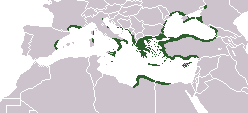
The Greek world in the mid 6th century BC.
By the 6th century BC several cities had emerged as dominant in Greek
affairs: Athens, Sparta,
Corinth
, and
Thebes
. Each of them had brought the
surrounding rural areas and smaller towns under their control, and Athens and
Corinth had become major maritime and mercantile powers as well.
Rapidly increasing population in the 8th and 7th centuries had resulted in
emigration of many Greeks to form
colonies
in
Magna
Graecia (Southern
Italy and Sicily
),
Asia Minor
and further afield. The emigration
effectively ceased in the 6th century by which time the Greek world had,
culturally and linguistically, become much larger than the area of present-day
Greece. Greek colonies were not politically controlled by their founding cities,
although they often retained religious and commercial links with them.
In this period, huge economic development occurred in Greece and also her
overseas colonies which experienced a growth in commerce and manufacturing.
There was a large improvement in the living standards of the population. Some
studies estimate that the average size of the Greek household, in the period
from 800 BC to 300 BC, increased five times, which indicates a large increase in
the average income of the population.
In the second half of the 6th century, Athens fell under the tyranny of
Peisistratos
and then his sons
Hippias
and
Hipparchos
. However, in 510 BC, at the
instigation of the Athenian aristocrat
Cleisthenes, the Spartan king
Cleomenes I helped the Athenians overthrow the tyranny. Afterwards,
Sparta and Athens promptly turned on each other, at which point Cleomenes I
installed
Isagoras as a pro-Spartan archon. Eager to prevent Athens from
becoming a Spartan puppet, Cleisthenes responded by proposing to his fellow
citizens that Athens undergo a revolution: that all citizens share in political
power, regardless of status: that Athens become a “democracy“.
So enthusiastically did the Athenians take to this idea that, having overthrown
Isagoras and implemented Cleisthenes’s reforms, they were easily able to repel a
Spartan-led three-pronged invasion aimed at restoring Isagoras.[11]
The advent of the democracy cured many of the ills of Athens and led to a
‘golden age’ for the Athenians.
Classical Greece

Early Athenian
coin, depicting the head
of Athena
on the obverse and her owl
on the reverse – 5th century BC

Attic Red-figure pottery
,
kylix
by the
Triptolemos Painter
, ca. 480 BC (Paris,
Louvre
)
Athens and Sparta would soon have to become allies in the face of the largest
external threat ancient Greece would see until the Roman conquest. After
suppressing the Ionian Revolt
, a rebellion of the Greek cities
of Ionia,
Darius I of Persia,
King
of Kings of the
Achaemenid Empire, decided to subjugate Greece. His invasion in 490
BC was ended by the Athenian victory at the
Battle of Marathon under
Miltiades the Younger
.
Xerxes I of Persia
, son and successor of Darius
I, attempted his own invasion 10 years later, but despite his larger army he
suffered heavy casualties after the famous rearguard action at
Thermopylae
and victories for the allied Greeks
at the Battles of
Salamis
and
Plataea
. The
Greco-Persian Wars continued until 449 BC, led by the Athenians and
their Delian League
, during which time the
Macedon
,
Thrace,
the
Aegean Islands and Ionia were all liberated from Persian influence.
The dominant position of the maritime Athenian ‘Empire’ threatened Sparta and
the Peloponnesian League
of mainland Greek cities.
Inevitably, this led to conflict, resulting in the
Peloponnesian War (431-404 BC). Though effectively a stalemate for
much of the war, Athens suffered a number of setbacks. The
Plague of Athens in 430 BC followed by a disastrous military campaign
known as the Sicilian Expedition
severely weakened Athens.
An estimated one-third of Athenians died, including
Pericles,
their leader.[12]
Sparta was able to foment rebellion amongst Athens’s allies, further reducing
the Athenian ability to wage war. The decisive moment came in 405 BC when Sparta
cut off the grain supply to Athens from the
Hellespont
. Forced to attack, the crippled
Athenian fleet was decisively defeated by the Spartans under the command of
Lysander
at
Aegospotami
. In 404 BC Athens sued for peace,
and Sparta dictated a predictably stern settlement: Athens lost her city walls
(including the Long Walls
), her fleet, and all of her overseas
possessions.
4th century
Greece thus entered the 4th century under a
Spartan hegemony, but it was clear from the start that this was weak.
A demographic crisis meant Sparta was overstretched, and by 395 BC Athens,
Argos, Thebes, and Corinth felt able to challenge Spartan dominance, resulting
in the Corinthian War
(395-387 BC). Another war of
stalemates, it ended with the status quo restored, after the threat of Persian
intervention on behalf of the Spartans.
The Spartan hegemony lasted another 16 years, until, when attempting to
impose their will on the Thebans, the Spartans suffered a decisive defeat at
Leuctra
in 371 BC. The Theban general
Epaminondas then led Theban troops into the Peloponnese, whereupon
other city-states defected from the Spartan cause. The Thebans were thus able to
march into Messenia and free the population.
Deprived of land and its serfs, Sparta declined to a second-rank power. The
Theban hegemony thus established was short-lived; at the
battle of Mantinea
in 362 BC, Thebes lost her
key leader, Epaminondas, and much of her manpower, even though they were
victorious in battle. In fact such were the losses to all the great city-states
at Mantinea that none could establish dominance in the aftermath.
The weakened state of the heartland of Greece coincided with the
Rise of Macedon, led by
Philip II
. In twenty years, Philip had unified
his kingdom, expanded it north and west at the expense of
Illyrian tribes
, and then conquered
Thessaly
and Thrace.
His success stemmed from his innovative reforms to the
Macedon army
. Phillip intervened repeatedly in
the affairs of the southern city-states, culminating in his invasion of 338 BC.
Decisively defeating an allied army of Thebes and Athens at the
Battle of Chaeronea (338 BC)
, he became de
facto hegemon of all of Greece, except Sparta. He compelled the majority of
the city-states to join the
League of Corinth, allying them to him, and preventing them from
warring with each other. Philip then entered into war against the Achemaenid
Empire but was assassinated by
Pausanias of Orestis
early on in the conflict.
Alexander
, son and successor of Philip,
continued the war. Alexander defeated
Darius III of Persia
and completely destroyed
the Achaemenid Empire, annexing it to Macedon and earning himself the epithet
‘the Great’. When Alexander died in 323 BC, Greek power and influence was at its
zenith. However, there had been a fundamental shift away from the fierce
independence and classical culture of the poleis—and instead towards the
developing
Hellenistic culture
.
Hellenistic Greece
The Hellenistic period
lasted from 323 BC, which
marked the end of the
Wars of Alexander the Great
, to the annexation
of Greece by the Roman Republic
in 146 BC. Although the
establishment of Roman rule did not break the continuity of Hellenistic society
and culture, which remained essentially unchanged until the advent of
Christianity, it did mark the end of Greek political independence.
During the Hellenistic period, the importance of “Greece proper” (that is,
the territory of modern Greece) within the Greek-speaking world declined
sharply. The great centers of Hellenistic culture were
Alexandria and Antioch
, capitals of
Ptolemaic Egypt
and
Seleucid Syria
respectively.
The conquests of Alexander had numerous consequences for the Greek
city-states. It greatly widened the horizons of the Greeks and led to a steady
emigration, particularly of the young and ambitious, to the new Greek empires in
the east.[13]
Many Greeks migrated to Alexandria, Antioch and the many other new Hellenistic
cities founded in Alexander’s wake, as far away as what are now
Afghanistan and Pakistan
, where the
Greco-Bactrian Kingdom
and the
Indo-Greek Kingdom
survived until the end of
the 1st century BC.
After the death of Alexander his empire was, after quite some conflict,
divided amongst his generals, resulting in the
Ptolemaic Kingdom (based upon
Egypt),
the Seleucid Empire
(based on the
Levant,
Mesopotamia and
Persia
) and the
Antigonid dynasty based in Macedon. In the intervening period, the
poleis of Greece were able to wrest back some of their freedom, although still
nominally subject to the Macedonian Kingdom.
The city-states formed themselves into two leagues; the
Achaean League (including Thebes, Corinth and Argos) and the
Aetolian League (including Sparta and Athens). For much of the period
until the Roman conquest, these leagues were usually at war with each other,
and/or allied to different sides in the conflicts between the Diadochi (the
successor states to Alexander’s empire).
The Antigonid Kingdom became involved in a war with the Roman Republic in the
late 3rd century. Although the
First Macedonian War
was inconclusive, the
Romans, in typical fashion, continued to make war on Macedon until it was
completely absorbed into the Roman Republic (by 149 BC). In the east the
unwieldy Seleucid Empire gradually disintegrated, although a rump survived until
64 BC, whilst the Ptolemaic Kingdom continued in Egypt until 30 BC, when it too
was conquered by the Romans. The Aetolian league grew wary of Roman involvement
in Greece, and sided with the Seleucids in the
Roman-Syrian War
; when the Romans were
victorious, the league was effectively absorbed into the Republic. Although the
Achaean league outlasted both the Aetolian league and Macedon, it was also soon
defeated and absorbed by the Romans in 146 BC, bringing an end to the
independence of all of Greece.
Roman Greece
The Greek peninsula came under
Roman
rule in 146 BC,
Macedonia
becoming a
Roman province, while southern Greece came under the surveillance of
Macedonia’s praefect. However, some Greek
poleis
managed to maintain a partial
independence and avoid taxation. The
Aegean islands
were added to this territory in
133 BC.
Athens and other Greek cities revolted in 88 BC, and the peninsula
was crushed by the Roman general
Sulla
. The Roman civil wars devastated the land
even further, until
Augustus
organized the peninsula as the
province of
Achaea
in 27 BC.
Greece was a key eastern province of the
Roman
Empire, as the
Roman
culture
had long been in fact
Greco-Roman
. The
Greek language
served as a
lingua franca in the East
and in
Italy,
and many Greek intellectuals such as
Galen
would perform most of their work in Rome
.
|





 mpanied
mpanied






